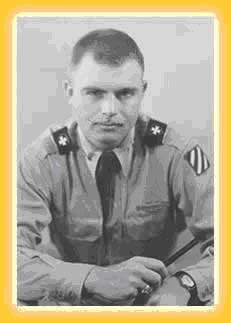Walt B. Clark, a first lieutenant and platoon leader of Company C, 65th Infantry Regiment's 2nd platoon "Borinqueneers," looked at his assignment as a challenge in leadership since he was selected to lead the mostly Spanish-speaking Soldiers from the tropical island of Puerto Rico.
The 21-year-old Clark had recently graduated from the Citadel, the Military College of South Carolina and Infantry Officer Basic Course.
Many officers at the time thought it was the kiss of death to be assigned to the Puerto Rican regiment. The critics mockingly called the regiment the "seeeexty feeeeth" trying to imitate the Spanish accent of most of the unit's Puerto Rican Soldiers.
Since his assumption of command of the platoon in March 1952, Clark wanted to instill in his men aggressiveness - "the spirit of the bayonet."
He kept a kitchen grinding stone present so his men could sharpen the 10-inch blade of their bayonets and insisted they carry their bayonets with them at all times. He even ordered his men to sleep with their bayonets affixed to their M-1 rifles.
Finally, after months of outpost duty, he and his platoon would get the chance to attack. The mission was conceived on short notice. The orders were to "raid Chinese outpost positions on Hill 167 in stealth and darkness, capture prisoners and leave a squad of volunteers on 167 to observe Chinese Main Line of Resistance (MLR) area - squad to remain for 48 hours."
Clark's platoon mission would be to actually go into the objective, seize the hill and take the prisoners. The rest of the company would provide suppression, security and support.
Third Division took no prisoners of war for weeks. Capt. Henry E. Hutcheson, company commander, explained that the S-2 (Intelligence) estimated half an enemy squad was occupying the objective as an outpost. At that rate, Clark's platoon should have no problem overwhelming the Chinese. A tank section on the MLR would provide support by fire. After assembling in darkness near the steep slopes of Hill 250, along the Outpost Line of Resistance, the company moved out July 18, 1952 and crossed the line of departure at midnight.
The company got lost in the dark. Noise discipline was very poor, undoubtedly alerting the enemy very early. When the sun rose they found the objective, negating the "stealth" part of the mission.
The Chinese allowed the platoon scouts to move within a few feet before opening up with a murderous fire of four Soviet Maxim heavy machine guns, small arms and grenades.
While the infantrymen lay hugging the earth and taking cover, a Chinese soldier on the hill signaled with a large red flag to fire mortar and artillery shells into the platoon's battle position.
Clark immediately charged into the enemy position leading his platoon of infantrymen with fixed bayonets shouting "Arriba Muchachos!"
Master Sgt. Santos Candelario, a platoon sergeant, helped to rally the rest of the platoon behind their lieutenant.
The lieutenant fearlessly led his men into position on three concentric trench lines on the hill.
Wounded by an enemy grenade, Clark continued his charge on the hill.
He hurled grenades and shot several enemy soldiers. As he entered a trench and turned a corner, he came face to face with a Chinese soldier. Instantly, they raised their weapons and fired at each other. Clark's M2 Carbine jammed but the enemy fired a burst from his Soviet Model PPSh41 "Burp Gun," hitting Clark in the thigh. Clark threw his weapon away and instinctively jumped on the enemy and began beating him with his steel pot. When the soldier moved, Clark remembered he still had his 45 revolver and shot him. The remaining Chinese troops nearby hurled grenades at Clark, wounding him in the legs, knee and face.
One of his Soldiers, Cpl. Jose Otero-Gonzalez, ran through the hail of fire, shooting and throwing grenades at the Chinese. Near one of the enemy trenches, he found his platoon leader injured and stretched out.
"I'll save you," Otero told his lieutenant.
Editor's note: See next week's edition of the Sentinel for the conclusion of Clark's mission.


Social Sharing